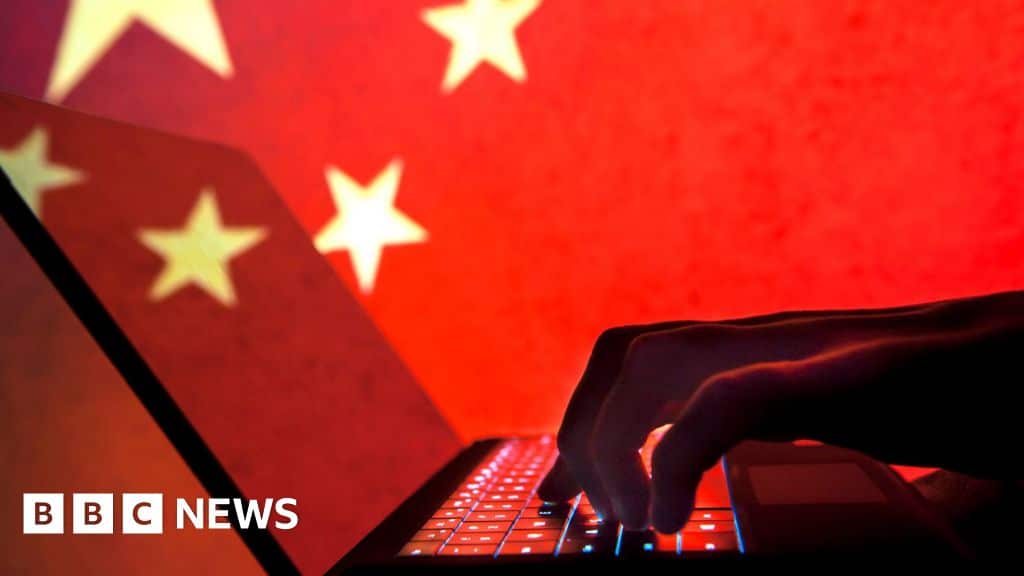Chinese Hackers Target US Agencies and Telecoms

The cybersecurity landscape has become increasingly alarming as US officials have linked a series of significant cyberattacks to hackers associated with the Chinese government. The most recent breach, announced on Monday, involved the US Department of the Treasury, which described the incident as a “major incident.” This breach allowed hackers to infiltrate employee workstations and access unclassified documents. China has denied any involvement, but this incident is part of a broader pattern of cyberattacks targeting US and Western entities. As concerns grow, it is essential to understand the scope of these attacks, the identity of the hackers, and the implications for national security.
Recent Breaches and Their Targets
The recent hack of the Treasury Department follows a troubling trend of cyberattacks against prominent US institutions. In late October, two major US presidential campaigns were also targeted. The FBI and the Cybersecurity and Infrastructure Security Agency (CISA) reported that these attacks were executed by actors affiliated with the People’s Republic of China. In September, reports emerged detailing a significant breach involving major telecommunications companies, including AT&T and Verizon. The White House confirmed that at least nine companies were compromised in this operation.
Earlier this year, seven Chinese nationals were charged for orchestrating a hacking campaign that lasted over 14 years. This operation targeted foreign critics of China, businesses, and politicians. The UK’s Electoral Commission and the parliaments of the UK and New Zealand have also been victims of similar attacks attributed to Chinese hackers. These incidents highlight a concerning trend of cyber-espionage that poses a significant threat to national security and the integrity of democratic processes.
Identifying the Hackers
While the full details of the hacking groups remain undisclosed, US authorities believe that multiple units linked to the Chinese state are responsible for these attacks. Security firms have assigned nicknames to these groups, with the one behind the telecoms hack commonly referred to as Salt Typhoon. Other names include Famous Sparrow, Ghost Emperor, and Earth Estrie. Salt Typhoon is specifically believed to be behind the telecoms breach, while another group, Volt Typhoon, has been accused of infiltrating critical infrastructure organizations for potential disruption.
The seven Chinese nationals charged by US officials were associated with an operation known as Zirconium or Judgment Panda. This operation has been linked to attacks on UK parliamentarians’ emails in 2021. The complexity and coordination of these hacking efforts suggest a well-organized strategy aimed at gathering intelligence and compromising sensitive information.
Data Compromised in the Attacks
The recent cyberattacks appear to have targeted influential individuals and sought to collect data that could be advantageous to the Chinese government. Notably, hackers accessed the phones of key political figures, including President-elect Donald Trump and Vice-President-elect JD Vance. They also targeted individuals associated with Vice-President Kamala Harris’s campaign.
Additionally, the hackers gained access to a database containing phone numbers subject to law enforcement wiretaps. This information could potentially reveal which foreign spies are under surveillance. The breaches at telecommunications companies may have compromised the data of millions of Americans. Richard Forno, assistant director of the University of Maryland, Baltimore County Cybersecurity Institute, noted that these efforts seem to be part of a broader strategy of information gathering, indicating a systematic approach to espionage.
US Officials’ Concerns and Responses
The recent wave of cyberattacks has raised alarm among US lawmakers from both parties. Senator Mark Warner described the activities of Salt Typhoon as the “worst telecom hack in our nation’s history.” Brendan Carr, a nominee for chairman of the Federal Communications Commission, expressed deep concern over the intelligence briefing regarding the hack. FBI Director Christopher Wray characterized Salt Typhoon’s actions as China’s “most significant cyber-espionage campaign in history,” emphasizing the scale of the threat posed by Chinese hackers.
In response to these incidents, US authorities have taken action against Chinese nationals involved in hacking activities. Earlier this month, they warned China Telecom Americas, a subsidiary of one of China’s largest communications companies, that it poses a national security threat. The company has been given 30 days to respond and could face a ban. The UK has also imposed sanctions on individuals and companies linked to Chinese hacking operations. Experts believe that these hacks have been years in the making, reflecting China’s long-term strategic approach to espionage.
China’s Denial and International Implications
In light of the accusations, China’s foreign ministry has vehemently denied any involvement in the cyberattacks. Spokeswoman Mao Ning described the allegations as “baseless” and lacking evidence. She emphasized that China opposes all forms of hacking and criticized the US for using cybersecurity issues to tarnish China’s reputation. A spokesman for the Chinese embassy urged the US to stop spreading misinformation regarding alleged hacking threats.
As the situation unfolds, the international community watches closely. The implications of these cyberattacks extend beyond national security, affecting diplomatic relations and global cybersecurity norms. The ongoing tension between the US and China over cybersecurity issues underscores the need for robust defenses and international cooperation to combat cyber threats.
Observer Voice is the one stop site for National, International news, Sports, Editor’s Choice, Art/culture contents, Quotes and much more. We also cover historical contents. Historical contents includes World History, Indian History, and what happened today. The website also covers Entertainment across the India and World.
Follow Us on Twitter, Instagram, Facebook, & LinkedIn

